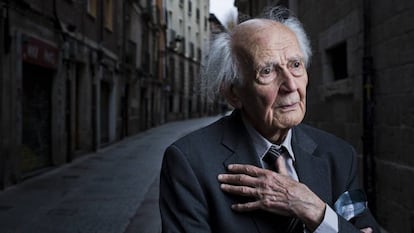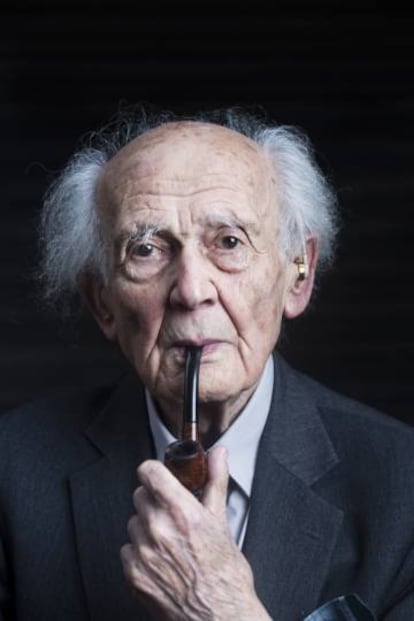Zygmunt Bauman, unlikely idol of Spanish protest movement, dies at 91
Polish-born thinker was revered by Spain’s ‘indignados’ for his critique of modern society


The death of Zygmunt Bauman at age 91 has silenced one of the most vocal critics of contemporary society. The Polish-born sociologist had coined the term “liquid modernity” to describe the individualistic and ruthless times that we live in, when nothing is solid anymore – not the nation-state, not family, not jobs, or our commitment to the community.
Bauman became a well-respected figure among 21st-century protest movements, from Occupy Wall Street to the indignados in Spain, which led to the creation of anti-austerity party Podemos. While he showed an interest in these protests, he was also prepared to point out their weaknesses: he felt that it is easier to come together in protest than in creating real proposals for change.
He was also skeptical about the power of the social media, because he felt that real dialogue only occurs when we talk to people who are different to us. Instead, he believed social media users create “comfort zones” where they only exchange ideas with those who think the same way.
Bauman granted EL PAÍS an interview almost exactly one year ago, during a visit to Burgos. In it, he discussed Spain’s protest movements, the separatist drive in Catalonia, and the rise of social media, which he described as “a trap.”
He wrote one, two, and sometimes three books a year, either individually or co-authored with other thinkers. He also delivered lectures and granted interviews in which reporters had to pick their questions carefully, because the answers would extend for many minutes in a succession of brief, very solid statements.

Bauman spoke slowly because he carefully crafted each of his sentences, creating a string of ideas that could have easily made for even more books than those he penned during his prolific career. With each pause, he would draw on his pipe.
Born in the Polish city of Poznan in 1925, Bauman died inside his home in the British city of Leeds surrounded by family members, said his associate Aleksandra Kania.
After suffering many of the horrors of the 20th century – war, persecution, purges and exile – he refused to become a conformist in times of peace. For over half a century he was one of the most influential observers of social and political reality, a scourge of the pervading superficiality in public debate. He captured the angst of modern people in a world that offers no security.
“All agreements are temporary, fleeting, and valid only until further notice,” he wrote.
English version by Susana Urra.
Tu suscripción se está usando en otro dispositivo
¿Quieres añadir otro usuario a tu suscripción?
Si continúas leyendo en este dispositivo, no se podrá leer en el otro.
FlechaTu suscripción se está usando en otro dispositivo y solo puedes acceder a EL PAÍS desde un dispositivo a la vez.
Si quieres compartir tu cuenta, cambia tu suscripción a la modalidad Premium, así podrás añadir otro usuario. Cada uno accederá con su propia cuenta de email, lo que os permitirá personalizar vuestra experiencia en EL PAÍS.
¿Tienes una suscripción de empresa? Accede aquí para contratar más cuentas.
En el caso de no saber quién está usando tu cuenta, te recomendamos cambiar tu contraseña aquí.
Si decides continuar compartiendo tu cuenta, este mensaje se mostrará en tu dispositivo y en el de la otra persona que está usando tu cuenta de forma indefinida, afectando a tu experiencia de lectura. Puedes consultar aquí los términos y condiciones de la suscripción digital.








































